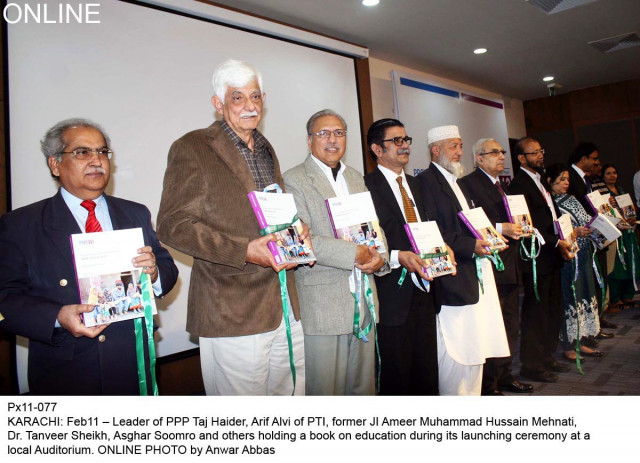Alarming statistics: 75% of fifth-graders in Sindh cannot read this headline
ASER's education report reveals figures about education standards that are outright worrying.

Politicians (L-R) Taj Haider of PPP, Arif Alvi of PTI, former JI Ameer Muhammad Hussain Mehnati, among others at the launch of the ASER Sindh report. PHOTO: ONLINE
While an overwhelming majority - around 75 per cent - of fifth grade students in Sindh cannot even read this sentence, hardly 29 per cent of them can do a simple two-digit arithmetic division, states the fourth provincial edition of the Annual Status of Education Report (ASER), launched at the Karachi School of Business and Leadership on Tuesday.

SOURCE: ASER
Ironically, the tests conducted were up to class two and three level standard, designed from the national curriculum textbooks. Though the learning levels are significantly better at private schools when compared to public institutions, the report can be termed an exposé of the much trumpeted 'private schooling'.
Compared to the 72 per cent of the fifth-grade students in public schools who could not do basic arithmetic division, around 53 per cent of their counterparts in private schools were not any different, said Aziz Kabani, the programmes director at the Sindh Education Foundation, while presenting the highlights of the survey before the audience.
Meanwhile, 77 per cent and 47 per cent were the test outcomes of the fifth graders from public and private schools, respectively, who were successful in reading a sentence in English of grade-two level.

SOURCE: ASER
"Aah ko chahiye ek umar asar hone tak," remarked Taj Haider, Pakistan Peoples Party's provincial secretary general, with regards to the apparent apathetic attitude of the government towards education. "The actual situation is much more horrendous, I believe. If the teachers were examined for their English reading instead of children, even they would have failed." Haider was invited to the launch along with Pakistan Tehreek-e-Insaf's Arif Alvi and Jamaat-e-Islami's Muhammad Hussain Mahenti.
Apart from elevating the students' learning level, the analysis of the past three ASER reports established that the Sindh government has failed to alter the school dropout trends over the last three years. "As the students shift from primary grades to the elementary level, enrolment decreases as the class level increases," said Kabani. "Sindh is seriously lagging behind as compared to other provinces of the country. Even with sincerity and commitment, we will have to go a long way."
Meanwhile, the importance of pre-school education for children between three to five years of age is overlooked by most parents. In the rural areas, around 59 per cent and more significantly, in the urban centres, over 37 per cent of children in this age bracket do not go to school.
Around 32 per cent of the public schools across the province do not provide potable water to their students, while around half of the public schools do not have usable toilets, the report stated about basic facilities at the schools.
"When we talk about 'facilities' for students at the schools, we do not ask to offer them luxuries. The demand is for the satisfaction of basic human needs," said Kabani. "Depriving the students of those needs raises the question of whether we consider them human beings or not."

SOURCE: ASER
ASER Pakistan began its journey in 2008, inspired by Pratham India, with a pilot in 11 districts as a citizens' initiative for understanding the state of children's learning, explained Baela Raza Jamil, director programmes at the Idara-e-Taleem-o-Aagahi.
"What started as a survey of a few rural districts has transformed in five years into the biggest national dataset on children's learning levels," Jamil told The Express Tribune. "We aim to assist the federal as well as provincial governments, private sector and the researchers with vital information regarding the learning outcomes for five to 16-year-old children - the precise age group stipulated under Article 25 A for extending education as a fundamental constitutional right."

She explained that the data is collected from households as well as government and private schools on the status of schooling and children's literacy and numeracy skills in local languages and English.
Published in The Express Tribune, February 12th, 2014.



1725254039-0/Untitled-design-(24)1725254039-0-208x130.webp)















COMMENTS
Comments are moderated and generally will be posted if they are on-topic and not abusive.
For more information, please see our Comments FAQ